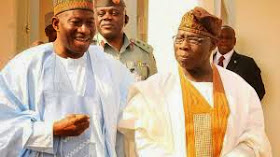By Ugochukwu Ejinkeonye
I
must congratulate myself on successfully avoiding virtually all of Gen Olusegun
Obasanjo’s usually ego-massaging and attention-craving books. I have, for
instance, NOT read Obasanjo’s My Command, Not My Will, Nzeogwu,
and his other little-known titles.
*Olusegun Obasanjo
(pix: magazine.tcu)
But
when his first wife, Mrs. Oluremi Obasanjo, published her book, Bitter-Sweet:
My Life With Obasanjo, I
went through a lot of stress to purchase a copy. I also wasted no time to read
and review it. Obasanjo had been talking
about other people and cutting them down with self-righteous zeal, so I wanted
to hear what somebody who had intimately shared a greater part of his life had
to say about him. Indeed, this is one
book Obasanjo would not like to be in circulation. But most people who have read the book would
readily recommend it as a background study to anyone interested in reading
Obasanjo’s books where he usually presents himself as one of the world’s most
righteous human beings and competent leaders. Like one reviewer said and I
agree, in societies where the law is alive and
active and treats everyone equally, “the allegations against Obasanjo [in that
book], if proven in a court of law, would have earned him a long stay in jail.”
Now,
Obasanjo has published another book which he called My Watch and I seriously
doubt that I would want to read it. There are several wonderful books lying in
my study and begging for my attention, so I would consider it a complete waste
of my time to read Obasanjo’s new book, which judging from the snippets
published in the media is nothing more than unappetizing potpourri of
cassava-market gossip, careless hawking of vicious, libelous allegations, and
further futile attempt at self-canonization. His aim, it appears, is to settle
some scores with his real or imagined adversaries, undermine President
Jonathan’s chances in the February 2015 elections and raise an ear-deafening
controversy that would turn the book into an instant best-seller.











